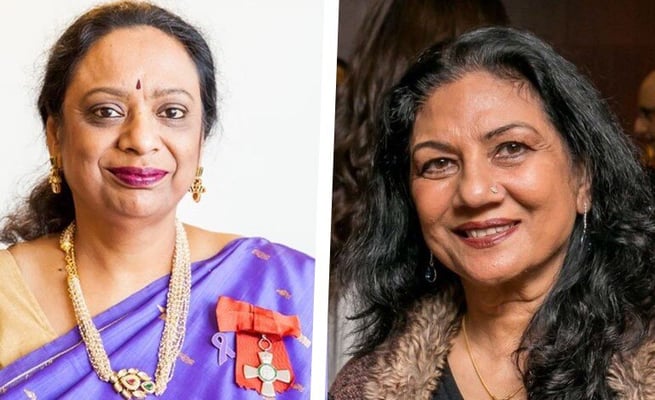Breaking the code of silence on family violence

‘Our community doesn’t stand up for victims of family violence’
“There is a lot of stigma attached to reporting family violence incidents among Indians,” says Nilima Venkat, General Manager at Shanti Niwas Charitable Trust, a not-for-profit that provides elder abuse and neglect prevention services to those of Indian and South Asian origin.
New Zealand has one of the highest rates of sexual and domestic violence in the developed world, with police responding to a family violence incident every four minutes. Family violence is estimated to cost the country between $4.1bn and $7bn a year and according to White Ribbon, a charity that aims to eliminate men’s violence towards women, only 20 percent of abuse cases in NZ are actually reported to the police.
To encourage a change toward better and healthier versions of masculinities this year, White Ribbon, as a part of its annual campaign, is gathering ‘stories of change’ to shine a light on violence prevention.
White Ribbon Day, which is observed every year on November 25, aims to share real-life experiences of both perpetrators and survivors to highlight the need to tackle men’s violence towards women, and to encourage people to call-in on incidents of family violence.
According to NZ Police data, in the past year leading up to August 2021, there were 151 cases of family violence reported by those identifying as Indian across NZ.
Some 93 of these victims suffered injuries at the hands of perpetrators who were either partners or family members.
Organisations like Shanti Niwas, Roopa Aur Aap, Sahaayta, Shakti, Gandhi Niwas, and others provide culturally appropriate services to the survivors of family violence in the Indian community, where the goal is to first work with families, rather than separating them.
Yet, there are many people within the community who do not seek help for the fear of condemnation by the community.
“People are worried more about their image, their career than their life,” says Roopa Suchdev, founder of Roopa Aur Aap, a not-for-profit that provides support to survivors of family violence.
“Family, community and peer pressure prevents them from stepping up and seeking help. We like to tell people that all is well on the outside, but something else is happening behind closed doors,” she continues.
People dependent on others for shelter, food and even visa or residency are more likely than others to not seek help.
“Generally those who are dependent on others are scared to stand up and report. They compromise, and bear with the consequences because they don’t want to rock the boat,” says Ms Suchdev.
“Most of the time the perpetrators are family members. If the victims are elderly, and their children are inflicting abuse on them, they are scared about how they will survive and who will listen to,” adds Ms Venkat.
Guilt, shame along with fatalistic beliefs are all factors that prevent people from reaching out, according to Ms Venkat. She says that people fear things will get worse after victims complains and that holds back many from seeking help at the right time.
Ms Venkat believes that Indians still carry with them a colonial mindset wherein we are afraid to go to the authorities. She says, “We are afraid of systems. We still have the colonial belief where we are afraid of the police, government and systems.”
White Ribbon campaigns aim to eradicate this fear by educating and promoting people to talk about healthy masculinity, respectful relationships, consent and call-in culture.
‘When someone says something stupid online, or says something sexist in real life, it is an opportunity to effectively engage them and have meaningful conversations to promote sustained change,’ says the callout for the campaign.
This sentiment is echoed by both Ms Suchdev and Ms Venkat who want the community to step up and call out incidents of violence.
“Our community doesn’t stand up for victims of violence. We believe if it’s not happening in my family or in my house, why should I poke my nose in their issues? This actually endangers the victim, because they know that person is being abused, but they don’t want to bring it to anyone’s notice. Since, that person may or may not seek help, the only way it will come to light is if someone reports it,” says Ms Venkat.
“You can always complain without anyone knowing, nobody is going to ask you for your name,” she says while urging the community to call out such incidents.
Putting a light on the many facets of abuse and how to intervene to help, this year’s White Ribbon is asking people to submit their ‘story of change’, via a secure website in any format e.g. a video, word document or audio file.
“We want to shine a light on what works and what supports people to change,” says White Ribbon Manager Rob McCann. “We know that when you have real life examples of change, that can be really motivating. But all too often, most of us don’t share our stories of experiencing or breaking the cycle of family violence. Too often these parts of our lives are hidden in the shadows in much the same way that family harm is often hidden behind closed doors.”
The public can also use Messenger on Facebook to share their story with White Ribbon privately, either in text or by video. They can post to their own Facebook pages and use the hashtag #WRstoriesofchange or #ShineALight. There is a link on the White Ribbon website that allows people to upload videos, images, word documents etc and it’s private until told otherwise. People can also send their stories by email to contact@whiteribbon.org.nz
‘Our community doesn’t stand up for victims of family violence’
“There is a lot of stigma attached to reporting family violence incidents among Indians,” says Nilima Venkat, General Manager at Shanti Niwas Charitable Trust, a not-for-profit that provides elder abuse and neglect prevention services...
‘Our community doesn’t stand up for victims of family violence’
“There is a lot of stigma attached to reporting family violence incidents among Indians,” says Nilima Venkat, General Manager at Shanti Niwas Charitable Trust, a not-for-profit that provides elder abuse and neglect prevention services to those of Indian and South Asian origin.
New Zealand has one of the highest rates of sexual and domestic violence in the developed world, with police responding to a family violence incident every four minutes. Family violence is estimated to cost the country between $4.1bn and $7bn a year and according to White Ribbon, a charity that aims to eliminate men’s violence towards women, only 20 percent of abuse cases in NZ are actually reported to the police.
To encourage a change toward better and healthier versions of masculinities this year, White Ribbon, as a part of its annual campaign, is gathering ‘stories of change’ to shine a light on violence prevention.
White Ribbon Day, which is observed every year on November 25, aims to share real-life experiences of both perpetrators and survivors to highlight the need to tackle men’s violence towards women, and to encourage people to call-in on incidents of family violence.
According to NZ Police data, in the past year leading up to August 2021, there were 151 cases of family violence reported by those identifying as Indian across NZ.
Some 93 of these victims suffered injuries at the hands of perpetrators who were either partners or family members.
Organisations like Shanti Niwas, Roopa Aur Aap, Sahaayta, Shakti, Gandhi Niwas, and others provide culturally appropriate services to the survivors of family violence in the Indian community, where the goal is to first work with families, rather than separating them.
Yet, there are many people within the community who do not seek help for the fear of condemnation by the community.
“People are worried more about their image, their career than their life,” says Roopa Suchdev, founder of Roopa Aur Aap, a not-for-profit that provides support to survivors of family violence.
“Family, community and peer pressure prevents them from stepping up and seeking help. We like to tell people that all is well on the outside, but something else is happening behind closed doors,” she continues.
People dependent on others for shelter, food and even visa or residency are more likely than others to not seek help.
“Generally those who are dependent on others are scared to stand up and report. They compromise, and bear with the consequences because they don’t want to rock the boat,” says Ms Suchdev.
“Most of the time the perpetrators are family members. If the victims are elderly, and their children are inflicting abuse on them, they are scared about how they will survive and who will listen to,” adds Ms Venkat.
Guilt, shame along with fatalistic beliefs are all factors that prevent people from reaching out, according to Ms Venkat. She says that people fear things will get worse after victims complains and that holds back many from seeking help at the right time.
Ms Venkat believes that Indians still carry with them a colonial mindset wherein we are afraid to go to the authorities. She says, “We are afraid of systems. We still have the colonial belief where we are afraid of the police, government and systems.”
White Ribbon campaigns aim to eradicate this fear by educating and promoting people to talk about healthy masculinity, respectful relationships, consent and call-in culture.
‘When someone says something stupid online, or says something sexist in real life, it is an opportunity to effectively engage them and have meaningful conversations to promote sustained change,’ says the callout for the campaign.
This sentiment is echoed by both Ms Suchdev and Ms Venkat who want the community to step up and call out incidents of violence.
“Our community doesn’t stand up for victims of violence. We believe if it’s not happening in my family or in my house, why should I poke my nose in their issues? This actually endangers the victim, because they know that person is being abused, but they don’t want to bring it to anyone’s notice. Since, that person may or may not seek help, the only way it will come to light is if someone reports it,” says Ms Venkat.
“You can always complain without anyone knowing, nobody is going to ask you for your name,” she says while urging the community to call out such incidents.
Putting a light on the many facets of abuse and how to intervene to help, this year’s White Ribbon is asking people to submit their ‘story of change’, via a secure website in any format e.g. a video, word document or audio file.
“We want to shine a light on what works and what supports people to change,” says White Ribbon Manager Rob McCann. “We know that when you have real life examples of change, that can be really motivating. But all too often, most of us don’t share our stories of experiencing or breaking the cycle of family violence. Too often these parts of our lives are hidden in the shadows in much the same way that family harm is often hidden behind closed doors.”
The public can also use Messenger on Facebook to share their story with White Ribbon privately, either in text or by video. They can post to their own Facebook pages and use the hashtag #WRstoriesofchange or #ShineALight. There is a link on the White Ribbon website that allows people to upload videos, images, word documents etc and it’s private until told otherwise. People can also send their stories by email to contact@whiteribbon.org.nz









Leave a Comment